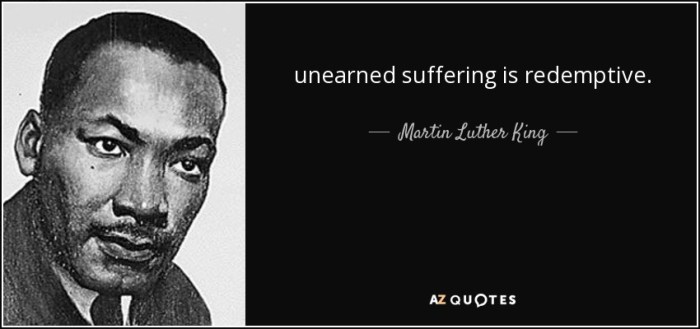As unearned suffering is redemptive meaning takes center stage, this opening passage beckons readers into a world crafted with good knowledge, ensuring a reading experience that is both absorbing and distinctly original.
Unearned suffering is a concept that has perplexed and fascinated philosophers, theologians, and laypeople for centuries. It refers to suffering that is not the result of any wrongdoing or fault on the part of the sufferer. This type of suffering can be particularly challenging to understand and accept, as it seems to defy the principles of justice and fairness.
Meaning of Unearned Suffering

Unearned suffering refers to experiences of pain, adversity, or loss that are not a direct result of an individual’s actions or choices. It is a multifaceted concept that has been contemplated by philosophers, theologians, and psychologists for centuries.
Unearned suffering can have a profound impact on individuals. It can lead to feelings of anger, resentment, and despair. It can also disrupt relationships, damage self-esteem, and hinder personal growth.
There are different perspectives on the meaning of unearned suffering. Some believe that it is a punishment for past sins or a test of faith. Others see it as an opportunity for personal growth and spiritual development.
Role in Personal Growth
Unearned suffering can be a catalyst for personal growth and resilience. When individuals face adversity, they are forced to confront their own vulnerabilities and strengths. This can lead to a deeper understanding of oneself and a greater appreciation for life.
Suffering can also foster self-discovery. By facing challenges, individuals can learn about their limits and capabilities. They can also develop new coping mechanisms and resilience skills.
Religious and Spiritual Perspectives
Many religions and spiritual traditions have beliefs about the purpose of unearned suffering. Some religions believe that suffering is a necessary part of life and that it can lead to spiritual growth.
In Christianity, for example, suffering is often seen as a way to imitate Christ. Christians believe that Jesus Christ suffered and died on the cross to redeem humanity from sin. By embracing their own suffering, Christians believe they can share in Christ’s redemptive work.
Ethical Implications
The concept of unearned suffering raises important ethical questions. If suffering is not a result of one’s own actions, then who is responsible for alleviating it?
Some argue that individuals have a moral obligation to help those who are suffering, regardless of the cause of their suffering. Others believe that the responsibility lies with society as a whole to create a just and equitable world where all people have access to the resources they need to thrive.
Coping Mechanisms
There are a number of coping mechanisms that can help individuals navigate unearned suffering. These include:
- Resilience: The ability to bounce back from adversity and maintain a positive outlook on life.
- Self-compassion: Treating oneself with kindness and understanding, especially during difficult times.
- Seeking support: Reaching out to family, friends, or professionals for help and guidance.
Impact on Society: Unearned Suffering Is Redemptive Meaning

Unearned suffering can have a significant impact on society as a whole. It can lead to social unrest, violence, and poverty.
However, suffering can also bring people together. It can create a sense of community and empathy among those who have experienced similar challenges.
Literary and Artistic Expressions

Unearned suffering is a common theme in literature and art. Many works of literature and art explore the human experience of suffering and its impact on individuals and society.
Some of the most famous examples of literary works that explore the theme of unearned suffering include:
- The Book of Job in the Bible
- The Odyssey by Homer
- Hamlet by William Shakespeare
- The Brothers Karamazov by Fyodor Dostoevsky
Clarifying Questions
What is the meaning of unearned suffering?
Unearned suffering is suffering that is not the result of any wrongdoing or fault on the part of the sufferer.
How can unearned suffering lead to personal growth?
Unearned suffering can lead to personal growth by fostering self-discovery, resilience, and compassion.
What is the role of unearned suffering in religious and spiritual traditions?
In many religious and spiritual traditions, unearned suffering is seen as a means of purification and spiritual growth.
What are some coping mechanisms for dealing with unearned suffering?
Some coping mechanisms for dealing with unearned suffering include resilience, self-compassion, and seeking support from others.